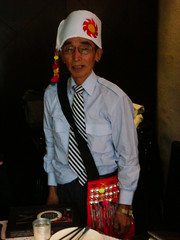其人幼年貧苦,博覽群經,武則天時舉進士,登文學優贍科。曾任縣尉、監察御史、光祿卿等官,清正平恕。舊唐書曰,「雖居吏職而篤學,手不釋卷,謙虛謹慎,深為玄宗所禮。」果然Tayal balay!!
何以知其為泰雅族?因為其名為馬懷素:Mahuway su!感恩、感恩!!

好了好了,很冷,下次不敢。
不過,我看,下次還是會再犯。
rambling physically and mentally in Wulai, a Tayal aborigine village in the mountains an hour's drive south of Taipei; various and sundry comments, criticisms, analyses, and snide remarks. talovich@mail.com

ptasan Abus
Facial tattoos have long been an important Tayal institution, but to bring them under control, the Japanese warlords banned the practice during their occupation of Taiwan. There has been much talk of reviving the tradition, but for men, the qualification was headhunting, which has also been banned. Other qualifications have been suggested, such as success at hunting (otherwise known as poaching) boar.
Abus, a Wulai Tayal, has long wanted to have his face tattooed, and I have egged him on for years. He has always been wary of the taboos connected with the tattoo, but finally, he thought of a way to get around that. Traditional tattoos for men were vertical. He got horizontal tattoos.
He said, "祖先哪有甚麼麻醉藥?沒有,要忍!所以我去文面的時候,我就不用麻醉,我就忍。Mxan balay!!很痛!!Our ancestors had no anesthetics, so when I got my tattoos done, I refused anesthetic. It hurt!!"
(I took this photo the other night with my cell phone. I’ll try to get a better one, with a camera during the daytime, and post it.)
大約十年前吧,颱風吹倒了一棵櫻花樹。我鋸一節一節,每節長四尺,扛回家放,想等它穩定了看怎麼雕。可是大概沒放好吧,蛀掉了。
沒辦法,放著放著;最近買了一個燒木柴熱水爐,就想把朽櫻燒掉。拿鋸子鋸時發現,外面一層爛了,可是裏面的紅心,堅硬如石,很難鋸。
劣材一蛀就壞到底。好材,經風吹雨打,或許外層有些蛀,卻不損內扗的堅實。
人生也如此。
About ten years ago, a typhoon blew down a large cherry tree nearby. I cut it into sections about four feet long and brought it home to cure, and then carve. I must not have stored it properly, because it rotted.
I left it where I put it. Recently we bought a wood burning water heater, so I figured I might as well saw up the cherry wood and burn it. When I put saw to wood, I discovered that even though the outside had rotted, the heart was red and rock hard.
Through years of hostile conditions, inferior wood rots to the core. On the surface, good wood may not look great, but its heart is stronger than before.
People are like that, too.
官位最高景頗族人,是雲南省副省長黃毅先生。黃先生身兼數職,包括雲南省海峽兩岸交流促進會名譽會長。今帶團來臺訪問,也拜訪臺灣景頗族。可惜閻光明前會長生病住院,不得來。孔大發會長請我們參加;我參加景頗族的活動,當初是緬僑會的簡明有先生介紹的,與幾年不見的長輩朋友見面,很開心。
The Jingpo (景頗, Jinghpaw, Kachin) at the highest level of government office is Mr Huang Yi, the Vice Governor of Yunnan Province. Among his many other offices is Honorary President of the Yunnan Cross Strait Exchange Association. He is in Taiwan now, leading a delegation of the Association.
He made time to visit Mr Zit Hkun Chang Sau (孔大發先生), President of the Taiwan Jingpo Association, who invited us to come along. Former President Xu Lang Ying (閻光明先生) is in the hospital, and unable to come. Mr Chian Mingyou (簡明有先生) of the Burmese – Chinese Association, who first invited me to Jingpo activities six or seven years ago, was along, as was Dr 何翠萍女士 Ho Ts'ui-p'ing, an anthropologist at Academia Sinica who studies the Jingpo. First we met at the 雲南同鄉會 Yunnan Association in Taiwan, and a small group went to a Yunnan restaurant for lunch. Zit Hkun had told me he was going to come in traditional Jingpo dress, but showed up in a dapper suit and tie. I asked what happened to the Jingpo outfit? He said, You can't wear a Jingpo outfit without a sword, and I just couldn't get on the bus wearing a sword, so I decided that rather than come without a sword, I would wear conventional clothing.
Mr Huang had met Zit Hkun some years ago when he (H) led a Jingpo delegation to Taiwan, so they had a lot to catch up on. Zit Hkun also had to catch up on his Jingpo. After so many years in Taiwan, he has lost some of his native language. Huang spoke to him in Jingpo, and Zit Hkun answered in a mixture of Jingpo and Mandarin, causing considerable mirth among the company. Jingpo came back to him very quickly with use.
Mr Chian is Chinese from Burma. He grew up in central Burma speaking Jingpo, and indeed went to Jingpo language schools until he was 12, when his father said, We're Chinese, you have to improve your Chinese language skills.
Huang presented Zit Hkun with a Jingpo turban and bag, as well as books with invaluable records of the Jingpo, including one of the Burma Road from WWII. Dr Ho, who has known Huang for many years, was presented with a scarf ("A Jingpo khatag"). To our surprise, Huang gave a Jingpo hat to me, and a scarf and bag to Chao, along with several books about the Jingpo.
But all in all, I have to say, we sorely missed Lazum wan Bau/金國光先生, who died a year ago. I wish he could have been there.

www.flickr.com
|